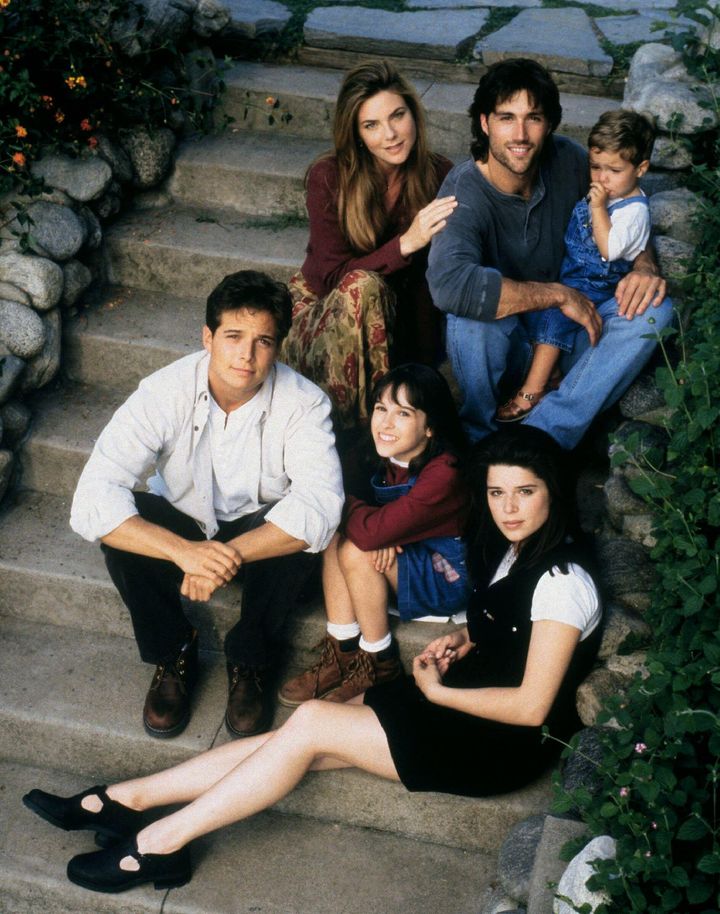
I’ll never forget the first time I came across “Party of Five,” Fox’s popular teen drama that celebrates its 30th anniversary this year. I had spent what amounted to the cost of designer jeans on the show’s individual DVD box sets, and they were a hallmark of my adolescence.
Growing up, TV dramas and daytime soap operas — “The Young and the Restless,” of course — were my only window to a world beyond my own. Like other young people, I struggled through my teenage years. Eighth grade is hard enough, and the homophobic insults didn’t make it any easier.
That summer wasn’t any better. I was too old to play outside and too young to drive or get a job. I didn’t have many friends that year. Usually, I would have had friends from school to call from my landline telephone to make plans during the summer, but that year, there were no numbers to call. My relatives started to notice — and the last thing I wanted was pity.
So I asked permission to use my mom’s credit card to order “Party of Five: The Complete First Season” from Amazon.
“Party of Five” centers on the Salinger family, whose parents have recently been killed in a car accident by a drunk driver. The eldest, Charlie (Matthew Fox), is in his early 20s, and the youngest, Owen, is barely a year old when the series begins. Much of the show’s drama revolves around the lives of Charlie and his siblings, who aside from Owen include Bailey (Scott Wolf), Julia (Neve Campbell) and Claudia (Lacey Chabert). Claudia is an 11-year-old piano prodigy, while Bailey and Julia are in high school, trying to find their footing in the world for the first time without any parents or role models.
Charlie is a 24-year-old jack of all trades, still trying to decipher his own identity while now in charge of four younger siblings. The conflict in the pilot episode focuses on Charlie gambling his family’s money on a construction deal that falls apart, leaving his siblings almost broke and forcing him to take a job as a waiter at their late father’s restaurant.
Watching this tension with 14-year-old eyes didn’t signify much to me. But I knew I couldn’t wait to see what would happen next. My expectations for televised entertainment at that age were decidedly simple. Give me a good family drama, and I’d cocoon in the basement for days.
Why “Party of Five”? Well, for starters, I know a thing or two about grief. I hadn’t lost my parents, but enough members of my immediate family had died by then for me to become somewhat indifferent to the idea of a death in the family. By the time I was 14 and deciding to watch the series, I had been through my own family drama. That summer, my cousin was suing my mom for allegedly mismanaging the funds of my aunt’s estate. This was after my mom had spent three years going back and forth during the week to finish raising her sister’s kids in a city two hours away.

I was reaching for a television series whose drama felt grown-up and complex to help me comprehend the mature adult crisis going on in my own family life.
My own complicated emotions surrounding my family drama wouldn’t fully come to the surface until I entered treatment for depression and anxiety when I was 18. Then, I began to properly process my feelings and realized not only do most people not lose that many loved ones in childhood, but that it also wasn’t normal.
Years later, as a 20-something fumbling through emerging adulthood, I realized that I’d become so accustomed to navigating adult emotions as a teen that my only outlet to express them was by consuming media outside of my age bracket. While my peers were obsessing over “The Hunger Games,” I was crying alone to a VHS copy of “The Bridges of Madison County.”
I revisited “Party of Five” recently, and I’m aghast at some of the storylines. I can’t imagine emotionally investing in a show about siblings of all age groups, left in the care of an older brother fumbling his way through emerging adulthood. It’s just too much for my heart to bear. On the other side of my own emotional turbulence, I can’t stomach watching even fictional characters go through something so intense — but then it was being packaged like everything would work itself out.
“I’d become so accustomed to navigating adult emotions as a teen that my only outlet to express them was by consuming media outside of my age bracket. While my peers were obsessing over ‘The Hunger Games,’ I was crying alone to a VHS copy of ‘The Bridges of Madison County.’”
As with a lot of scripted television from the ’90s, the first season of “Party of Five” is presented through a romanticized lens. What happened to the Salingers was tragic and inconceivable to most, but what matters is their perseverance and ability to hold on to the togetherness of family, as if it were that simple. In fact, if Season 1 of “Party of Five” is indeed more saccharine, like other teen shows of the time, the rest of the series is a stark departure: Bailey battles alcoholism, Julia marries far too young and is later involved in a domestic violence incident, and Charlie fights cancer.
The show’s only comparable peer would be “My So-Called Life,” which premiered the same year and infamously ran for only one season. While the social issues on “Party of Five” were mature, real and worth exploring, it reads now as one unnecessary trauma dump after another, even if the series was light-years ahead of its time in portraying the long-term mental health effects of grief and tragedy.
The Salingers appear to have persevered through their trauma by the end of the series, but it’s the kind of determination you only need to watch once.
For myself, and undoubtedly countless other trauma survivors, “Party of Five” isn’t a show we necessarily need to revisit for comfort year after year. It’s why I’ve only ever been able to make it two or three episodes into a rewatch. The series came into my life for a purpose, and it fulfilled its mission. The past can be a nice place to visit, but I don’t need to stay there long.
I’m sure the Salingers would agree.
Disclaimer: The copyright of this article belongs to the original author. Reposting this article is solely for the purpose of information dissemination and does not constitute any investment advice. If there is any infringement, please contact us immediately. We will make corrections or deletions as necessary. Thank you.
